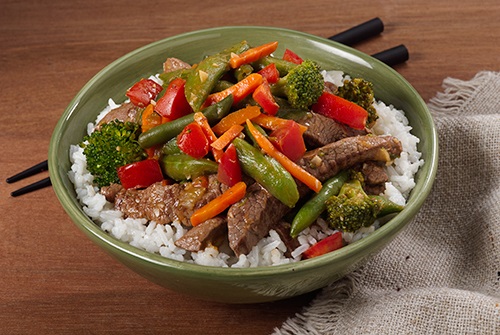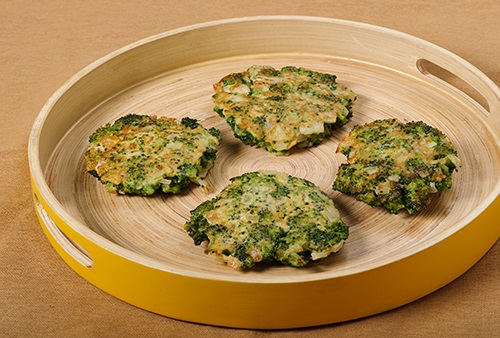Food Facts Friday: Broccoli
Broccoli is a versatile vegetable that can be enjoyed year round. It is delicious both raw and cooked, as a snack, appetizer, or part of the main dish. Because broccoli is naturally low in potassium, sodium and phosphorus, it fits perfectly into a kidney-friendly diet.
Serving Size and Nutrition Facts
One cup of raw broccoli florets is equal to one serving and contains 20 calories, 2 g protein, < 1 g fat, 4 g carbohydrates, and 1.6 g fiber.1 Broccoli is low in potassium, sodium, and phosphorus. It contains 230 mg potassium, 19 mg of sodium, and 47 mg phosphorus per serving. It is also nutrient dense and contains a small amount of calcium, magnesium and vitamin C. It is rich in folate, vitamin A, and vitamin K. Folate, one of the B vitamins, is needed for proper cell functioning and brain health. It may even play a role in preventing depression and promoting heart health.2,3 Vitamins A and K are fat soluble vitamins, meaning adequate fat intake, digestion, and absorption is important for these vitamins. Vitamin A, an antioxidant, promotes a healthy immune system and good vision.2 Vitamin K is essential for blood clotting- and may also play a role in bone health and decreasing inflammation in the body.
Cost
Broccoli can be purchased fresh in florets, already chopped in bags, or frozen. Bags of broccoli can also be found mixed with other vegetables such as carrots and cauliflower. One pound of broccoli usually costs about $2.00, but may vary depending where you live and the season.4
Choosing Broccoli
When choosing fresh broccoli, first look for a bright vibrant dark green color. Next, avoid wilted leaves or broccoli florets that are brown or yellow in color. Broccoli stems should be firm. Last, make sure the buds are compact and tightly closed.5
Storing Broccoli
Broccoli is best stored in the refrigerator in the crisper or in loose bag because it benefits from air circulation during storage. Wash immediately before eating. For the best taste, eat as soon as possible, but it will keep up to 7 days refrigerated.
Cooking Broccoli
Broccoli is delicious raw or cooked. It can easily be steamed in the microwave or on the stove stop or baked.
- Steaming in the microwave: Wash and chop broccoli to desired size. Place in a microwave safe bowl with 1-2 tablespoons of water. Cover with another microwave safe bowl. Microwave for 2-3 minutes, stir, and then repeat until broccoli achieves desired softness.
- Baking: Preheat oven to 400° F. Wash and chop the broccoli to desired size. You can also chop stems into smaller pieces and bake with the broccoli florets. Toss with vegetable or olive oil and season with pepper, garlic powder, and onion powder. Bake for about 15-18 minutes.
Broccoli Recipes
Try these kidney-friendly broccoli recipes from the DaVita.com collection.
Entrees:
- Beef and Broccoli Stir-Fry

- Vegetable Paella
- Creamy Shrimp and Broccoli Fettuccine
- Crunchy Tofu Stir Fry
Resources
- https://ndb.nal.usda.gov/ndb/foods/show/301764?manu=&fgcd=&ds=&q=Broccoli, raw. Accessed July 16, 2018.
- Byrd-Bredbenner, C., Moe, G., Beshgetoor, D., Berning, J. Perspectives in Nutrition, 8th edition. McGraw Hill Higher Education. New York, NY. 2009. P. 400, 402-408, 424 460.
- Ware, M. Why is folate good for you? Medical News Today. https://www.medicalnewstoday.com/articles/287677.php. Last updated June 2018. Accessed July 16, 2018.
- Broccoli-Average retail price per pound and per cup equivalent. Fruit and Vegetable Prices. United States Department of Agriculture: Economic Research Service. https://www.ers.usda.gov/data-products/fruit-and-vegetable-prices.aspx. Last updated July 11, 2018. Accessed July 16, 2018.
- Broccoli. CUESA Cultivating a Healthy Food System. https://cuesa.org/food/broccoli. Copyright 2018. Accessed July 16, 2018.
This article is for informational purposes only and is not a substitute for medical advice or treatment. Consult your physician and dietitian regarding your specific diagnosis, treatment, diet and health questions.


Recent Comments